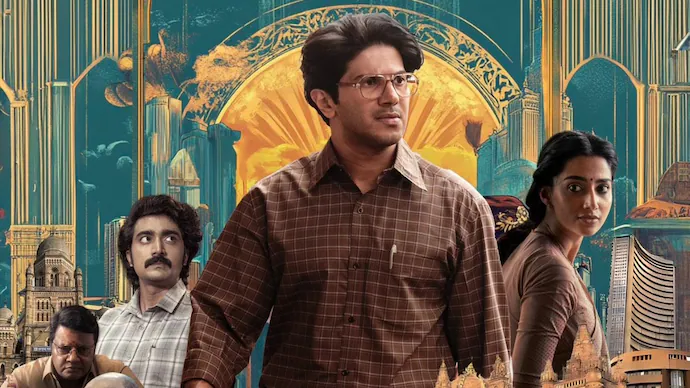This handsomely mounted film keeps surprising us. And it’s a big help that this world – this world of finance – is new and has seldom been explored on screen before.
Look at the way Dulquer Salmaan’s name is spelt in Lucky Baskhar. It is not “Bhaskar”. It’s written to rhyme with “lucky bastard”. And that’s what the protagonist is in this entertaining drama about financial crimes. He’s lucky. He gets away with a lot of misdeeds in the bank he works in, and the witty screenplay revels in tightening the noose before releasing it. We keep thinking “This is it… This time, Baskhar’s luck has run out… he is going to get caught…” And then, we are taken back in time to see what Baskhar did to plot his escape. Does he finally get caught? That, I cannot tell. But the film is a pleasurable instance of a fresh story being told in an interesting way, with the help of a charismatic star in top form.
Lucky Baskhar, which is set in Mumbai, opens in 1989. The man is married to Sumathi (Meenakshi Chaudhary), and one of the things he says early on is that he lives in the money capital of the country. Another way to put this is that he lives in a city that only cares about money. Baskhar does well in his job, but is passed over for a promotion because of a deal done behind his back – and this deal, obviously, involves money. Sumathi comes from a moneyed family and they do not respect Baskhar because he has no money. Sumathi dreams of a home food business, and that will need a lot of money. Baskhar’s father has been cheated of money, and this has left him paralysed. Baskhar’s brother’s education in London, his sister’s wedding – all of this is going to cost money.

But two things hurt Baskhar the most. One is that posh shops in the city judge people by the way they are dressed, by the car they drive – in other words, by the perceived amount of money they have. The second incident involves Baskhar’s son, who is thrilled when his parents throw him a lavish birthday party. Later, they find the boy weeping, because he recalls the time his friends used to make fun of him for attending their birthday parties and eating free cake without throwing a party for his birthdays. These touching middle-class sentiments take us right into the story, where the middle-class Baskhar decides enough is enough and begins to participate in financial scams. And remember this is the era of the Big Bull, who is referred to here as Harsha Mehra.
Lucky Baskhar is the financial equivalent of the vigilante justice movies where we cheer for the protagonist knowing well that he is operating outside the law. The protagonist becomes a kind of vessel for our wish-fulfilment, that someone will punish the corrupt, at least on the big screen. Here, we cheer for Baskhar because his financial problems are extremely identifiable, and he becomes the vessel for our wish-fulfilment – that someone is able to do these things and get away with them for the most part. Except for the generically written wife, every character gets to shine, and Dulquer, especially, uses his charm and the twinkle in his eye and totally sells this likeable criminal. Baskhar pays big money to beggars he recruits for his scams. He supports a fellow scamster when things go wrong. There’s a sense of fairness about this man. He says, “We should stand together not just in the happy times but also in the hard times.”
So despite his crimes, we never hate Baskhar and he never becomes a villain. At first, he does these scams for his need – and then for greed. Making money becomes a drug-like addiction, and Dulquer’s performance acquires newer, subtler shades. Apart from Sumathi’s ultra-melodramatic family, the portions with Baskhar drinking and barking at his wife and generally acting like an a-hole do not register as well as the other parts of the movie. Thankfully, these portions don’t last very long, and this is also a movie that keeps moving. Right on top, we watch Baskhar jogging and the camera takes this cue and keeps moving, too, swooping in towards and away from Baskhar in terrific, very well-lit sets. This is a handsome production, and GV Prakash’s score fits right in. I think it must have been a relief for the composer to work with very different material, and his dynamic music adds an extra layer of momentum.
Whether Baskhar turns over a new leaf or whether he sticks to his life of crime, whether Baskhar is a sociopath or merely an opportunist, that is for you to find out. But we never stop rooting for Baskhar, and till the last scene, this is a film that keeps surprising us. And it’s a big help that this world – this world of finance – is new and has seldom been explored on screen before. All the scams are detailed well and easy enough to follow, and all of them contain delightful little twists. The sense we get (right or wrong) is that it’s all about the survival of the fittest. Towards the end, we seem to get a bit of moralising in a talk between two bankers, but even this is handled very cleverly, with a wink. Lucky Baskhar proves what storytellers in literature always knew: amorality is always interesting.


